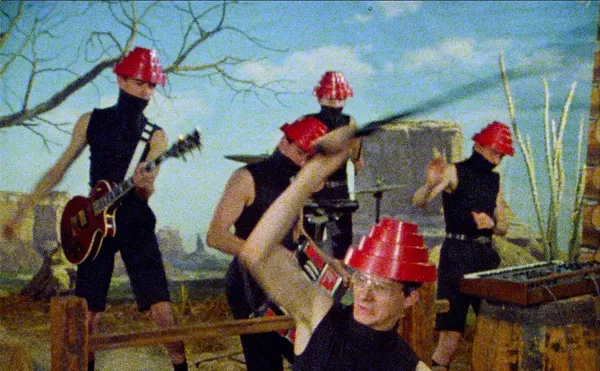Up the Yangtze is perfect counter-programming to the pomp and circumstance of the 2008 Beijing Olympics, an incisive and humane look at the emergence of China as a world power through the eyes of those displaced by the enormous Three Gorges Dam. This monumental hydroelectric project is said to be China's largest feat of engineering since the ancient Great Wall was constructed, and it too has great symbolic significance. Creating this towering manifestation of Chinese economic might has meant the flooding of communities on the banks of the Yangtze, with 2 million residents forcibly relocated.
This immense undertaking was explored briefly in another Canadian documentary, Manufactured Landscapes (2006), where it was seen through the lens of photographer Edward Burtynsky, whose specialty is finding the beauty in massive earthworks. The director of Up the Yangtze, Yung Chang, understands the scale of the Three Gorges Dam, but his focus is on the rising waters and how they are obliterating the China his grandfather once knew. He uses the experience of a farewell cruise, luxury riverboats that ferry mostly Western tourists up the Yangtze to witness the changing topography, as a way of examining the enormous shifts in Chinese society.
Chang blends his own observations of a swiftly changing China with those of the displaced (one frustrated shop owner describes the fragility of individuals facing the crushing power of the state) and the relentlessly upbeat pronouncements of the Victoria Cruise guides, who paint the new landscape rising out of the drowned communities as a clean slate of prosperity. Chang then turns his camera on two new cruise employees, Yu Shui, 16, and Chen Bo Yu, 19, and Up the Yangtze becomes Chinese Teen, insightfully exploring their adolescent rites of passage.
Given the English names of Cindy and Jerry, and put through a "life training" course, their responses are as different as their backgrounds. For Jerry, the indulged and self-important only child of a prosperous family, working the tourists means fast money, but he considers it slumming. For Cindy, eldest child of farming peasants who can't afford her continuing education, her low-level job represents a giant step up, and exposure to the newly cosmopolitan China of capitalist indulgence.
Chairman Mao, seen swimming the fabled river, vowed to remake the Yangtze. Chang follows the rising tide of Chinese determinism, charting its course for a new future, and documenting the human toll left in its wake.
Showing at the Detroit Film Theatre (inside the DIA, 5200 Woodward Ave., Detroit) at 7 and 9:30 p.m. on Friday-Saturday, Aug. 15-16 and at 4 p.m. on Sunday, Aug. 17. Call 313-833-3237 for more information.
Serena Donadoni writes about film and culture for Metro Times. Send comments to [email protected].






